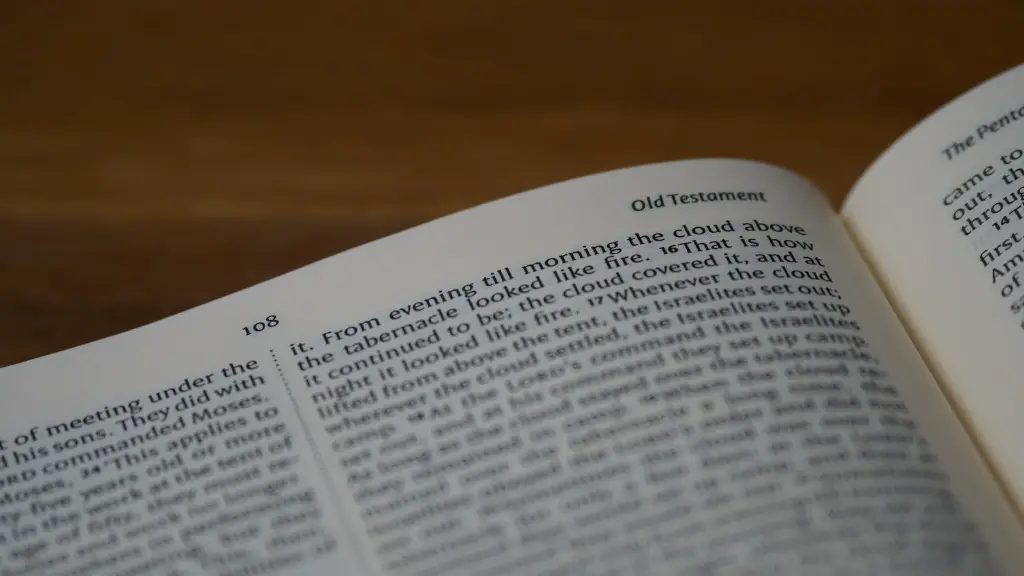The Bible is an ancient book filled with wisdom, teachings, and stories that have been passed down for generations. It is also a source of great controversy and debate, particularly when it comes to the issue of homosexuality. A number of people have purported that the Bible speaks out against it, while others have argued the contrary. So, what does the Bible actually say about homosexuality?
To answer this question, we must first look at the various interpretations of what the authors of the Bible were trying to convey. We know that they wrote the scriptures in different languages and at different times in history. Therefore, it is difficult to accurately determine what the authors’ true intentions were in every single case.
The most commonly referred to scripture when talking about homosexuality is Leviticus 18:22, which reads: “You shall not lie with a male as with a woman; it is an abomination.” This passage has been used by some to argue that homosexuality is an abomination and should be viewed in the same way as other sins.
However, it is important to understand the cultural context of this scripture. In the ancient world, homosexuality was seen as a violation of certain traditions and codes of conduct, and so it was forbidden. This does not mean, however, that it is forbidden today.
Christian theologians have interpreted the Bible in different ways, depending on their beliefs and values. Some have argued that homosexuality is not a sin and should not be treated as such, while others have contended that it is an abomination and those engaging in it should be held to a different standard of behavior.
It is important to understand that the Bible can be interpreted in many different ways and that it is up to each individual to decide how they want to interpret it. That being said, it is also important to note that there are passages in the Bible that can be read as condemning homosexuality. Therefore, it is important to view the Bible as a guide for one’s personal spiritual life and to understand the scriptures from the perspective of one’s own beliefs and values.
Different Biblical Interpretations
The Bible is open for interpretation as there are a range of opinions and views concerning homosexuality depending on which authority you listen to. Many Christian denominations have adopted more open and affirming positions on this subject, whereas others have remained steadfast in their opposition to any form of same-sex relationships. The Bible itself does not make any definitive statement on the issue.
Most interpretations of the Bible can be roughly broken down into two camps. There are those that view it as condemning homosexuality and those that view it as being supportive or neutral on the issue. Proponents of the former stance often point to verses in the Old Testament such as Leviticus 18:22, while proponents of the latter will cite passages such as Romans 1:26-28 or 1 Corinthians 6:9-11.
In order to understand the different interpretations of the Bible regarding homosexuality, it is essential to consider its broader context. Christianity is a faith that emphasizes love, compassion and forgiveness, not judgment and exclusion. Therefore, it should be no surprise that many Christians feel that the Bible does not prohibit homosexual relationships but rather condemns certain extreme forms of behavior.
How to Interpret?
While the Bible does not offer a clear-cut answer to the question of whether or not homosexuality is sinful, it is up to each individual to decide how they interpret its teachings. Ultimately, it is a matter of personal conscience and spiritual growth. There is no one-size-fits-all solution.
It is important to remember that the Bible is a collection of stories and texts written by different authors in different contexts throughout history. Therefore, it is not possible to interpret it as a unified body of work, without taking into account the historical, cultural, and individual circumstances surrounding each passage.
It is also important to keep in mind that many different religious denominations have different understandings of the Bible’s teachings concerning homosexuality. Therefore, in order to draw wise conclusions, one must take into account the range of opinions and perspectives from different denominations.
Wrong Perceptions
Despite the lack of a definitive answer regarding homosexuality in the Bible, there has been a tendency in some parts of the Christian community to equate homosexuality with sin or immorality. This has led to a perception that homosexual relationships are inherently wrong and that Christians should oppose them. Such views are not only misguided and out-dated, they can also lead to a marginalization of gay and lesbian people and the demonization of their lifestyle.
Therefore, it is important for Christians to approach the issue of homosexuality in the same way that they would any other subject: with an open mind, willingness to learn, and a compassionate heart. This does not mean that one must accept homosexuality as morally permissible, but it does mean that we should respect the dignity and worth of every individual regardless of their sexual orientation.
At the same time, it is important to recognize that there are a wide range of opinions and beliefs within the Christian community on the issue of homosexuality. There is no single, definitive answer, and the only way to draw reasonable conclusions is to engage in civil dialogue and to consider a range of perspectives. This is the only way that we can begin to move forward, and ultimately find common ground.
Resulting Impact on Society
While the debate continues, it is undeniable that the issue of homosexuality has had a significant impact on society. Further discussion on the topic is essential in order to gain a better understanding of the underlying issues and to ensure that those of different sexual orientations feel safe, respected and accepted within their communities.
The acceptance of a non-binary understanding of gender and sexuality has been gaining traction in recent years and many members of the LGBTQ+ community have become vocal advocates for their rights and visibility. This has resulted in a greater acceptance of homosexuality as a valid lifestyle choice, in some areas of the world at least.
In spite of this, it is still important to remember the individuals who have experienced discrimination, stigma and shame due to their sexuality over the years. It is only through understanding and acceptance that these individuals can be fully embraced within the Christian faith and respected in their communities. While the Bible may not provide a clear answer on the matter, it nevertheless serves as a reminder that there is room for us all in the eyes of God.
Understanding Variety of Lifestyles
There are countless ways to live a life, and not all of them can or should be judged by moral codes. While the Bible provides valuable guidance, it is important to remember that human sexuality is far more nuanced and complex than any set of ancient laws or commandments. It is up to each of us to decide how we want to interpret the scriptures and how we respond to the various lifestyles and sexual orientations we encounter in the world today.
The key takeaway is that we should respect the dignity of every individual regardless of whether or not we agree with their lifestyle. It is possible to disagree without being disagreeable. We should strive to treat all people with kindness, compassion and understanding, regardless of their beliefs or lifestyle choices. In this way, we can build a more inclusive and welcoming world for all.
Finding Common Ground
As we continue to grapple with the issue of homosexuality, it is important to remember that we all have much more in common than we often realize. It is up to each of us to seek out common ground and foster an environment of respect and acceptance, even in the face of disagreement. This ultimately comes down to a commitment to listen to each other, to understand different perspectives, and to engage in reasonable dialogue regardless of our personal beliefs.
Homosexuality is a complex issue that has been debated for many years. Ultimately, it is up to each individual to decide how they interpret the Bible in regards to this subject and to follow the teachings that guide them in their own spiritual journey.
Be Kind and Engaged
There is no one right or wrong answer, and it is important to recognize that there is a great deal of diversity within the Christian community on this issue. Therefore, it is essential that we accept people’s differences and strive to create an inclusive and welcoming environment for all.
At the end of the day, the best way to approach the issue of homosexuality is with kindness, respect and an open heart. We should seek to learn and understand, rather than to judge and condemn. In this way, we can find common ground and foster an environment of acceptance and understanding.





